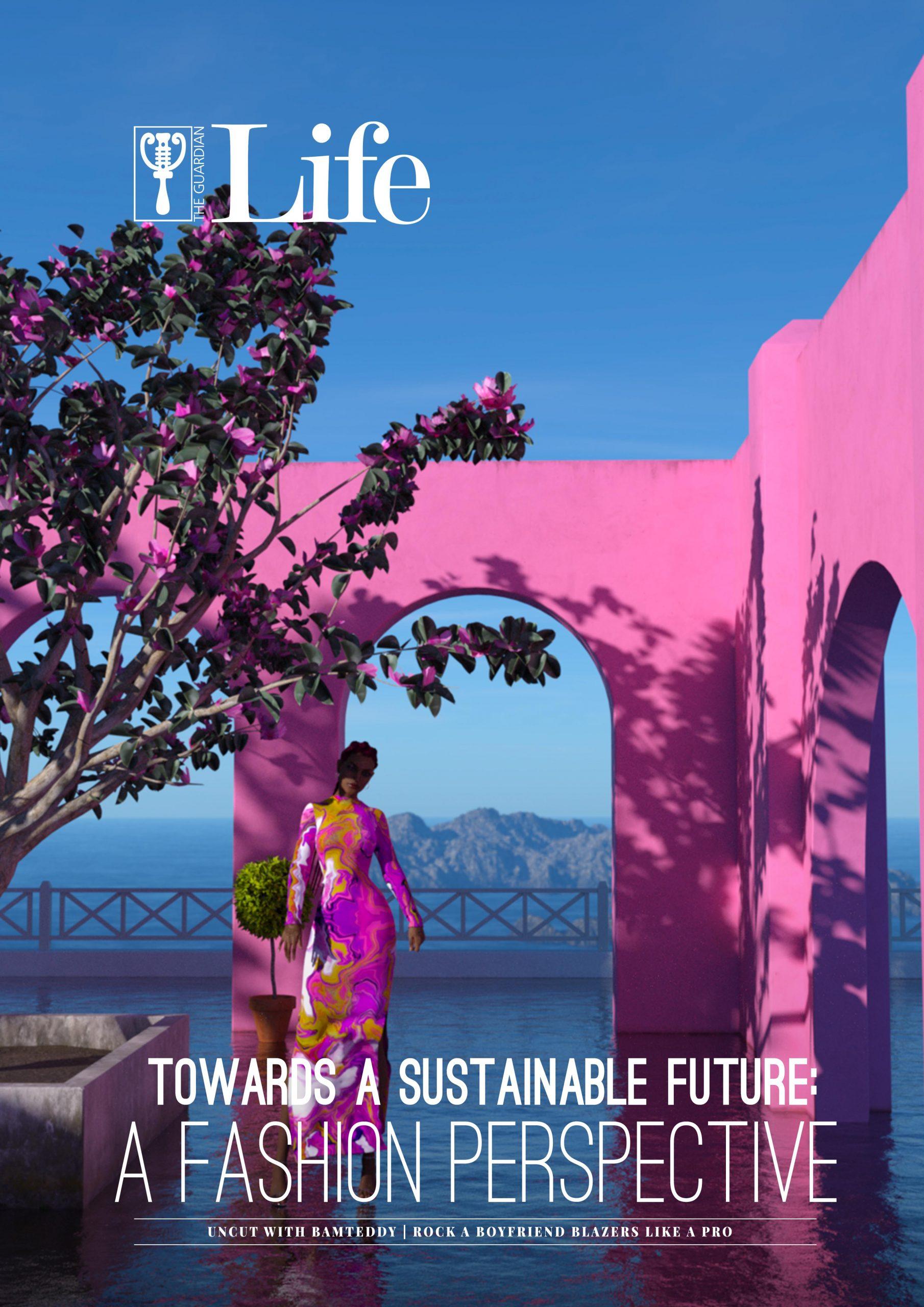Fashion
A Trend Perspective — Guardian Life — The Guardian Nigeria Information – Nigeria and World Information

By Christopher Ebuka
27 February 2022 |
6:00 am
Sustainability- a buzzword thrown round by vogue insiders, however what precisely does it imply? Sustainability, in easy phrases, means to maintain one thing over a protracted time period. As a coverage, sustainability considerations itself with financial, social, and environmental betterment. When narrowed into vogue, sustainability means taking socio-economic and environmental-friendly approaches to the manufacturing, distribution,…
Sustainability- a buzzword thrown round by vogue insiders, however what precisely does it imply? Sustainability, in easy phrases, means to maintain one thing over a protracted time period. As a coverage, sustainability considerations itself with financial, social, and environmental betterment. When narrowed into vogue, sustainability means taking socio-economic and environmental-friendly approaches to the manufacturing, distribution, and consumption of vogue merchandise.
Environmental Points
The style trade, if charged on all counts of contributing to water waste, carbon emission, wildlife endangerment, and oceanic microplastic air pollution could be discovered responsible. In response to the BBC, the worldwide vogue trade contributes ten % of worldwide carbon emissions and twenty per cent of water waste. The World Financial Discussion board (WEF) reported the style trade because the second largest water client. Thirty-five % of oceanic microplastic air pollution got here from the style trade in response to Worldwide Union for Conservation of Nature.
How do these come about? Let’s discover quick vogue. Because the title depicts, quick vogue is, sure, vogue that’s quick. Or on this planet of the style model Zara, twenty-four collections in a yr. Quick vogue manufacturers have been criticised for the extreme quantity of collections which might be put out annually.
To place this in perspective, the worldwide vogue trade acknowledges two main vogue seasons in a yr: spring/summer season and fall/winter. Each time, designers launch a resort assortment. Some designers additionally make couture. So, a designer who checks all these would make about 5 collections per yr. Even that’s thought-about extreme. This contributes to the aforementioned issues, together with air pollution and waste.
Low-cost poisonous chemical dyes are utilized in colouring garments. Wastewater from dyes is discharged into native drainages and linked to the ocean. These poisonous chemical substances have a direct impression on aquatic lives and even human lives, in the course of the manufacturing of those garments and consumption of dietary fish.
Analysis revealed in Springer said that eighty billion garments are bought annually. 5 hundred thousand used garments are exported from america yearly as second-hand clothes. The garments that can’t be bought change into waste.
The tactic of manufacturing additionally keys into the issue. Many of the garments made immediately are both made with pure fibres or artificial fibres. Cotton, wool, and silk supplies all make up the pure fibre household. These supplies required much less poisonous manufacturing methods. The uncooked supplies are obtained from nature and require little or no processing. Pure fibres are biodegradable; which means they’re able to decomposition. However, there are artificial fibres. Polyester is an artificial fibre. Because of how low cost it’s, some manufacturers go for artificial supplies to chop the price of manufacturing. Artificial supplies require a chemical response to be made. Coal, one of many supplies used within the manufacturing of artificial supplies, causes air air pollution throughout manufacturing. Petroleum, one other uncooked materials used within the manufacturing of artificial fibres, produces dangerous gases like carbon monoxide. Whilst a completed product, polyester is non-biodegradable. It’s unable to decompose.
Manufacturing, small or massive scale, requires a specific amount of water utilization. To course of a fabric, even on the most-sustainable degree, a surplus quantity of water could be required. The jean firm, Levi’s, produces a number of the best-selling trousers on this planet. Everyone has owned a pair of denims by Levi’s at one level of their life. A research reveals that it takes two thousand, 300 and eighty thousand litres of water are used within the manufacturing of 1 pair of denims by Levi’s. One other 600 and fifty litres of water are estimated for client care.
Nonetheless, with requires sustainability, the corporate is now taking motion by recycling water. They’ve additionally been popping out with modern methods of lowering water waste.
Socio-Financial Points
The worldwide vogue trade is about three trillion {dollars} and makes up two % of the world’s gross home product. Trend might be enjoyable and political and highly effective. Trend has outlined a era of superheroes; from batman to spiderman. Their costumes are simply as a lot of an announcement as their powers. Trend creates tens of millions of jobs world wide. Sure! Sure!! Trend is fantastic. However vogue might be merciless and exploitative.
A warehouse, crammed with machines, lots of of employees, lengthy hours, poor working situations, and little or no pay. This paints the image of a sweatshop, however that is dominant in locations like Bangladesh, China, and Colombia. Though much less dominant, it nonetheless exists in components of North America and Europe. Quick vogue firms use sweatshops in Asia. Some have arrange in-house sweatshops to satisfy calls for. In response to The World Depend, sweatshop employees receives a commission about three cents per hour. In 2013, an eight-story constructing in Bangladesh fell killing over 300 and fifty folks, leaving 1000 folks injured. The manufacturing unit employees had been warned of a crack within the constructing which they ignored. 5 months earlier than that, 112 folks misplaced their lives in a fireplace in Dhaka. There have been a number of sweatshop incidents, through the years, brought on by negligence and inhumane working situations.
In Nigeria, there are native artisans dwelling in rural areas. These artisans barely converse English. They don’t have any formal schooling. And so they have no idea something about enterprise. Their expertise are handed down from era to era. These artisans are expert in varieties of material making; they hand-weave Akwete, Aso oke, and hand-dye Adire. Some designers supply them out, soliciting their providers. In the long run, these artisans are poorly paid. These artisans make impeccable works for some vogue manufacturers who place themselves as luxurious manufacturers whereas being paid lower than 5 % of the promoting value.
The large query has been, who’s guilty: producers or shoppers? If the producers don’t manufacture so many, shoppers wouldn’t purchase. If the shoppers didn’t need a lot, the producers wouldn’t manufacture. Consumerism has grown by 400% previously 20 years, in response to Inexperienced Pop.
The celeb tradition has keyed into this. The tradition of wear-once and discard. Social media influencers frown on the concept of repeating garments. Carrying an outfit greater than as soon as is dominated as a cardinal sin. It additionally doesn’t assist that quick vogue makes it straightforward to purchase extra for much less. This undoubtedly will increase consumerism; shopping for garments not as a result of they’re wanted however as a result of they’re needed.
Consumerism is, additionally, aided by e-commerce. As soon as upon a time, one wanted to go away the home to purchase merchandise. Now, with a number of faucets, one might furnish an house with out leaving a room. One might additionally inventory a complete wardrobe by means of on-line purchasing. A refined habit that almost all have, however nobody talks about.
Manner Ahead
Equal pay may start a motion in the direction of equitability and sustainability. Firms in developed nations maintain flocking to creating nations for affordable labour. One purpose why firms in creating nations maintain supplying low cost labour is to beat the competitors. It’s the survival of the one who can lower prices probably the most. Firms in developed nations misuse these alternatives as a result of they know that poverty creates desperation. A easy option to resolve that is for unions to set an equal value for all. Buying and selling inside a creating nation will, subsequently, require equal pay no matter who one chooses to commerce with.
Additionally, Underneath the EU regulation on Unfair Industrial Practices, buying and selling is considered unfair and thought of a legal offence if it comprises false info, omission, and strange industrial intent. Creating nations might undertake and implement a regulation specializing in bringing fairness and sustainability to merchants.
Customers have a significant function to play. Demand pushes provide. The much less demand there are, the much less quick vogue manufacturers would manufacture. A reuse and recycle private coverage may go a good distance in curbing extra consumption of vogue. Aware purchasing primarily based on want slightly than need. Having a minimalistic method to spending can be a great way. Purchase garments that may be re-worn and restyled. Customers also needs to maintain their favorite manufacturers to a normal: who made your garments? How a lot have been they paid? And with what supplies?
Firms ought to go for modern methods to fabricate their merchandise. Various supplies might be sourced. Select pure slightly than artificial. Take waste into consideration. Take the employee’s situations into consideration. Can the time of manufacturing be shortened to save lots of vitality? In what methods can air pollution be diminished? Are the employees being paid nicely? Do we actually want twenty-four collections in a yr? Make insurance policies to restructure how items are manufactured and redistributed.
Transparency and accountability are the most effective methods to go about making certain sustainability within the vogue trade. Deliberate actions and insurance policies to make sure a sustainability-first method to sourcing, manufacturing, distribution, and consumption.
The timeline of quick vogue and its direct impression on the setting begins with the manufacturing.
























